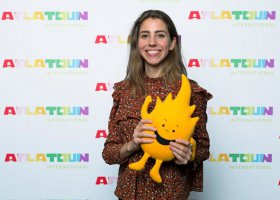Livia is the Monitoring and Evaluation Manager at Aflatoun International. She leads research projects, using both quantitative and qualitative methods to assess the effect of Aflatoun’s programmes on children and young adults. Livia has experience in conducting impact assessments and evaluations for the public sector, including for the Dutch Ministry of Foreign Affairs. She has a bachelor’s degree in Economics and a master’s degree in Development Economics from the University of Amsterdam.
Livia enjoys working with a highly international team at Aflatoun and a large variety of partner organisations around the world. She is a strong advocate of Aflatoun`s approach to education. Read Livia’s latest blog here to learn more about her work at Aflatoun.
Why do you work for Aflatoun International?
Education is a basic need and a fundamental right for every human being. I work for Aflatoun International because I believe that social and financial education is key to bringing positive transformation in the lives of individuals and societies. It decreases socio-economic inequalities that hamper development, especially that of girls. Aflatoun’s innovative student-centred and playful approach is something I strongly endorse because it promotes children’s creativity as opposed to traditional teaching methods.
What is your role at the organisation?
I work on assessing the impact of Aflatoun’s social and financial education on children and young people in various contexts. Together with local researchers and implementing partners, we generate empirical evidence on the effectiveness of Aflatoun’s programs. It is my role to provide insightful and comprehensive research findings, from which Aflatoun and the sector at large can learn. The ultimate objective is to use this evidence to continuously improve Aflatoun’s curricula and its program designs.
Why is social and financial education important?
Financial education is becoming more important as we live in an increasingly financial world. Equipping children and youth with financial knowledge and skills is needed so they can make economic decisions that benefit them now and later in life. Combining financial education with social education teaches children that financial gains should never be at the expense of one person’s safety. The strength of social education is in its promotion of human rights, sexual reproductive health, self-awareness, empathy and diversity.
What do you like most about Aflatoun International?
I really like that at Aflatoun we work with a wide variety of partner organisations: from local grassroots organisations to national governments and international organisations. Besides, I love that Aflatoun’s team in Amsterdam is so purpose-driven and consists of more than 20 different nationalities, which I believe makes it a truly unique and inspiring place to work.
What is something NGOs have to deal with that you work to fix?
As an NGO we need to continue filling the gap between policy and what is needed on the ground. It is Aflatoun’s duty to generate evidence on the effectiveness of our programmes in different contexts to attract donors to invest in social and financial education and channel these financial resources together with technical expertise to local organisations. It is extremely important to support local actors and involve them in program design, contextualization and implementation as they know best what is needed in specific contexts.
How do you see the future of Aflatoun International?
Aflatoun will continue to focus on partnering with local NGOs that can provide social and financial education to children and young people in areas with very low access to education, and in particular invest in the education of girls who are too often ‘left behind’. At the same time, I see a big opportunity for Aflatoun to continue supporting local NGOs in raising awareness with national governments about the importance of including social and financial education in national curricula.
Share with us a motto or quote close to your philosophy of life.
“When we educate women, their community prospers, but if we deny them education, the world will suffer.”

